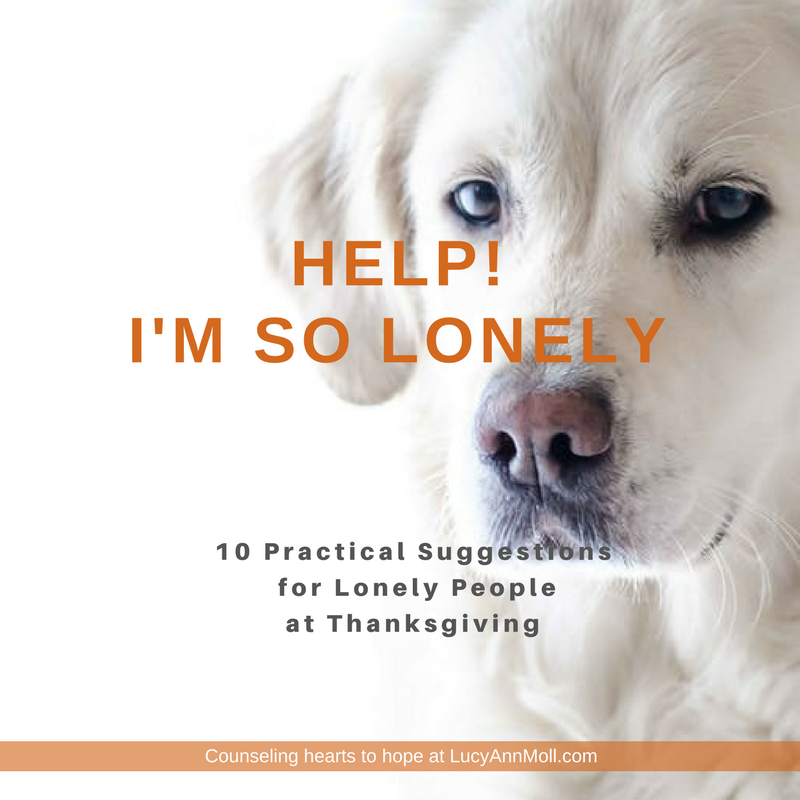
by Lucy | Nov 19, 2018 | biblical counseling, relationships
1. Identify trouble spots.
As you look at the calendar, identify dates and places that may prove painful during the holidays. For me, Christmas Eve is tough because my mom always hosted Christmas dinner at her home, but now she’s gone. So years ago, my husband and I began a new tradition of making Christmas pizza with the kids. It helped us handle the grief.
You may also choose to not attend a certain party, or stay for an abreviated time, or attend with a caring friend who’s aware of your pain and helps you as needed.
I think of a former counselee with an abusive family member whom she needed to avoid. She made sure her close cousin was aware of this trouble spot, and she stayed by her side at a holiday dinner where he’d be present. Identifying this trouble spot and telling her cousin made all the difference.
2. Loss is not the boss!
Yes, the loss of a broken dream or a loved one’s passing may seem impossible to survive. But remember that loss is not the boss. Rather Jesus is Lord over all, including your losses.
Click & Tweet!
Here’s a verse that has helped me and many counselees:
Because of the Lord’s great love we are not consumed, for his compassions never fail. They are new every morning; great is your faithfulness. Lamentations 3:22-23
3. Grieve on purpose.
Yes, grief can come out of the blue when you least expect it. But you can take charge and grieve on purpose on your time. Some ways to do this:
- Journaling
- Listening to music
- Walking in nature
- Have a meaningful conversation with a friend
As you grieve on purpose, you honor the memory of your loved one. You can also begin to dream new dreams that replace the broken one.
4. Recognize that you’re not alone.
No one has it all together. And this includes that woman at church who’s all smilles and pep. (In fact, she may be hiding a hurt.)
One struggles with grief, another with memories of a broken marriage, a wayward child, or a past regret. We each hurt in different ways, right?
But be sure to not go it alone during the holidays. Reach out to a trusted Christian friend or a biblical counselor. Psalm 56:1-4
5. Surround yourself with other believers.
When you hurt, it’s tempting to stay under the covers on Sunday morning and every morning. But you’ll be glad you flung off the blankets and put your feet on the floor.
Consider my counselee Nicole who struggled with loss (a divorce as well as the death of a loved one). When her grief began to pull her into despair, she reached out for counseling, and I listened deep to her story.
She had gotten into a bad habit of lingering in bed and mulling over her problems, leading to more hopelessness. So we put together an action plan including a simple morning routine. Soon she noticed her spirits lift as she followed the action plan. Of course her grief didn’t go away immediately. In fact some of it will probably stick around as she misses her loved one and life as it once was, especially during the holidays.
But now she is living with purpose. She meets with friends, volunteers at a school, participates in a women’s Bible study, and attends church where we believers are called to “bear one another’s burdens.” Having friendships with Christian women has helped greatly in her healing.
Carry one another’s burdens; in this way you will fulfill the law of Christ. Galatians 6:2
What About You?
Are you looking to the holidays joyfully or are they a source of pain? Think of one step you can take to lessen your own grief or that of another. Now plan how you’ll put this step in action and do it. Let me know how it goes. 🙂
Counseling Hearts to Hope,


by Lucy | Sep 5, 2018 | biblical counseling
Welcome to “How to Talk Like Jesus!” This short series helps you communicate the truth in love with family, friends, and neighbors who might “make” you want to scream or run like Forrest Gump. Are you ready for the secret to godly communication? Let’s go.
 Your Talk Exposes Your Heart
Your Talk Exposes Your Heart
Did you know what you say and how you say it reveals a lot about you? And about what you think of God? Your communication exposes your heart.
For the mouth speaks out of that which fills the heart. Matthew 12:34, NASB
As in water face reflects face, so a man’s heart reveals the man. Proverbs 27:19, NKJV
As a man thinks in his heart, so is he. Proverbs 23:7, NLT
Here’s a time I handled communication poorly. The family member: my dad’s wife.
She doesn’t like me very much. I’m not sure why. A while back, she stomped into a restaurant where my dad and I were enjoying a late lunch, and her words flew at me like daggers: “Why are you here with him? He should be home with the children. You just want his money.” I said, “The children are young adults. And I’m here to see my dad, not get money.” He tried to quiet her and I moseyed toward the hostess at the cash register.
Honestly, I just wanted to feel safe, not talk like Jesus. I withdrew. Thankfully my dad’s wife soon left. I felt sad, confused. My dad felt worse. His smile had become a grimace.
Your Talk Reveals Your Beliefs
 Your heart is highly important to God. Think of your heart as the control center of your inner self. It reveals your beliefs and your motivations.
Your heart is highly important to God. Think of your heart as the control center of your inner self. It reveals your beliefs and your motivations.
What you believe guides your thoughts and actions. God cares about your communication because he cares about you and your beliefs.
He desires your focus to be on Jesus, not on yourself. When your beliefs are “me-centered,” you’ll show them by what you say and what you do. A “me-centered” heart is prideful, selfish, lonely, angry, fearful, and sad, and such is your communication.
Did you know that the Bible says if a person can control their tongue, they’ll be able to control all their desires/passions/affections?
For we all stumble in many ways. If anyone does not stumble in what he says, he is a perfect man, able to bridle the whole body as well. James 3:2, NASB
How to Talk Well
Dr. Stuart Scott, an author and a professor at the Southern Baptist Theological Seminary, shares six prerequisites to good communication. Here are the first two. In the next Wednesday Word, you’ll discover more.
- To talk like Jesus, you must want to please God more that anything else. Ask God for help in desiring to please him more than you want to have your own way or to be right. Desire to know him as he reveals himself in Scripture.
For am I now seeking the approval of man, or of God? Or am I trying to please man? If I were still trying to please man, I would not be a servant of Christ. Galatians 1:10, ESV
- To talk like Jesus, you must be humble. The opposite of humility is pride. When you choose to communicate humbly, your words and your nonverbal communication will demonstrate patience. If you’re humble you’ll be patient when you’ve been misunderstood. You’ll lovingly speak truthfully, and you’ll listen much more than you talk.
Make It Practical!
To help improve your communication, choose this week to do two things:
First, do not interrupt when someone else is speaking. Instead, listen.
Second, when you’re talking, pause once in a while, so the other person has a chance to speak.
 Friends, are you interested in impoving communication with your spouse? Your family? A boss? I’d love to counsel hope to your heart and give you biblical solutions to the problem you’re facing. Send me a message and we can set up a complimentary 20-minute consultation by phone.
Friends, are you interested in impoving communication with your spouse? Your family? A boss? I’d love to counsel hope to your heart and give you biblical solutions to the problem you’re facing. Send me a message and we can set up a complimentary 20-minute consultation by phone.
Counseling Hearts to Hope,

by Lucy | Nov 23, 2017 | biblical counseling, emotions, relationships
 Are you lonely? During the holidays, lonely folks–and Christians get lonely too!–are as numerous as snowflakes in a Minnesota blizzard.
Click & Tweet!
Still, knowing this fact doesn’t take away the emptiness, does it? So what helps? Pastor Paul Tautges shares part of the booklet “Help! I’m So Lonely” by biblical counselor Deborah Howard, RN, an article that appeared first on his website. He is the editor of the Help! series.
Are you lonely? During the holidays, lonely folks–and Christians get lonely too!–are as numerous as snowflakes in a Minnesota blizzard.
Click & Tweet!
Still, knowing this fact doesn’t take away the emptiness, does it? So what helps? Pastor Paul Tautges shares part of the booklet “Help! I’m So Lonely” by biblical counselor Deborah Howard, RN, an article that appeared first on his website. He is the editor of the Help! series.

Loneliness takes many forms and its causes are almost endless. There’s loneliness from. . .
- Losing a spouse or other loved one.
- Being alone in a new environment.
- Being single in what seems like a world full of couples.
- Being in a loveless or troubled marriage.
- Being married to someone who, through debilitating illness, is a shadow of his/her former self.
- Being elderly, often starved for companionship or a friendly touch.
- Being exceptional—whether exceptionally beautiful or plain, exceptionally intelligent or cognitively challenged, exceptionally fat/skinny, exceptionally tall/short, exceptionally famous or seemingly invisible.
- Anything that sets us apart from others can cause us to feel disconnected and isolated.
Not only are there different causes, but loneliness varies in other ways. Some loneliness is temporary; some is long-term. Some is deep and aching; some is merely unsettling. Some causes minor discomfort; some causes major dysfunction.
Deborah Howard, RN, penned the wonderful mini-book HELP! I’m So Lonely. In it she explains why loneliness is an age-old problem and how God ministers to us in our loneliness.
10 Practical Suggestions
But what practical suggestions could help us in our loneliness? And what help could we give to lonely people? Deborah gives the following bits of counsel in her final chapter. The following is a brief summary of her counsel.
1: Spend Time with People When You’re Lonely
Spend time with people. Whether you realize it or not, you need people.
Click & Tweet!
Loneliness and grief shouldn’t be kept to yourself. Perhaps you don’t want to be in big crowds. Fine. Then spend one-on-one time with someone you care about. Schedule lunch with a friend and notice the taste of the food, the décor, the waiter/waitress—try to live “in the moment.”
2: Listen Closely
Listen closely to your lunch companion’s conversation. The first few times you do it may seem empty and unfulfilling. But keep doing it.
3: It’s OK to Cry When You’re Lonely
Don’t be afraid or ashamed to cry. Crying can be therapeutic. It may make other people uncomfortable, but that’s their issue, not yours. Tears are a healthy response to loss. It doesn’t mean you don’t trust the Lord or that your faith is weak.
Click & Tweet!
It simply means your heart is breaking and your body is responding appropriately for you!
4: Spend Time Outside
Enjoy some peace and quiet in nature. If you prefer spending time alone, don’t do it locked up in your house. Get outside. Surround yourself with nature. It’s amazing how the Lord ministers to us through His creation. Even something as simple as sitting outside, enjoying the sunshine or a gentle breeze can be amazingly restorative and uplifting.
5: Take Care of Yourself When You’re Lonely
Take care of yourself. Basically, this means doing the things that ensure your overall physical well-being. Grieving people sometimes forget or skip the simplest tasks. Eat regular, healthy meals. True, cooking nutritious meals for one isn’t easy.
But don’t just eat “easy” stuff—take-out, fast food, or microwave meals—and miss out on important nutrition (in fact, watching a person’s weight is a good way to determine how well they are coping with loss). So try to eat regularly, even if food seems to have lost its taste and appeal. You need it to get better.
6: Try Something New!
Cultivate new interests. Get involved in meaningful activities. This may mean taking a cooking or art class. Helping others can be fulfilling, so you might consider volunteering at a soup kitchen, church, hospital or hospice. Maybe you’ve always wanted to learn another language, or how to garden, play tennis or the violin. Do it now.
7: Journal When You’re Lonely
Keep a daily journal of your thoughts. Set daily goals and meet them. No one else has to ever see your work. But writing is a way to express the inner workings of your heart/mind. It can be therapeutic to put your thoughts on paper, to review them periodically and see the progression of the healing process.
 8: Hello, Fido! Hello, Fluffy!
8: Hello, Fido! Hello, Fluffy!
Consider getting a pet. It’s amazing how much company a pet provides. Pet ownership provides unconditional love, a reason to get out of bed, something to be responsible for, and a continual source of amusement.
9: Hang with Your Church Family When You’re Lonely
Don’t abandon the people of God. The church can be of significant value to those who are hurting and lonely. In a way, the body of Christ (His church) is like arms that can embrace you, hands that can serve you, expressions of empathy that can comfort you. Don’t turn your back on that kind of support. Sometimes a person becomes angry at his circumstances and angry at God. As a result, he becomes lonelier.
10: Stay in the Word
I’ll end this list of suggestions with this one. Even if you know the Bible well, you’ll need to stay in the word. It reminds us of truths we need to meditate upon. The scriptures help us keep the big picture in perspective. We must constantly remember who we are and Who He is! We must constantly be reminded of His love, His justice, His sovereignty, His patience with us. By keeping our minds focused on His word, we can do this. Stay in the word. Devour it. Trust it. Lean upon it. It will provide all we need to live our lives responsibly, lovingly, and obediently.
Resources!
If you are struggling with loneliness (or are concerned about a friend), seek counsel in Deborah’s mini-book, HELP! I’m So Lonely.
You also may like to check out all of the books in the Help! series. Click here to see them.
Counseling Hearts to Hope (and healing!),


by Lucy | Dec 29, 2016 | biblical counseling, emotions
DEPRESSION: Many of us feel depressed around Christmas. Did you know scientists and biblical counselors recognize at least three myths about depression?
In part 3 of this three-part series, learn the truth about medication for depression. Part 1 looked at . . . Part 2 covered diagnosis and the Bible. This post first appeared here on CareLeader.org, June 29, 2016, and is used with permisison.
Would you like caring biblical counseling for depression? I offer counseling by Skype and in person. Contact me. Let’s set up a short complimentary consultation. Don’t go it alone.

Myth #3: Medication Doesn’t Help Treat Depression
Some people are under the impression that depression is purely a spiritual issue and that medication isn’t effective or needed in treating depression.
Click & Tweet!
Some who cite the ineffectiveness of antidepressants claim that they are slightly more effective than a placebo.
A fact sheet produced by MIT explains the origin of that idea:
Clinicians began hearing this question from patients after news articles reported on a 2002 analysis of published and unpublished studies submitted to the U.S. Food and Drug Administration (FDA) as part of the approval process for several new types of antidepressant medication. This analysis concluded that the newer types of antidepressants are only marginally more effective than placebo.
However, these analyses do not reflect how antidepressants are used in actual practice. Drug trials measure only how a person responds to a single medication taken at a specific dose for a limited time. In clinical practice, however, the patient and clinician work together to find the dose and the medication or combination of medications most effective for you. Most clinicians believe that this process results in much better results than these analyses imply.
Medication: A Wisdom Issue
Dr. Michael Emlet, in an interview for our DivorceCare and Single & Parenting projects, pointed out that the Bible doesn’t prohibit taking medications for psychiatric disorders. He said,
When Jesus came, He not only forgave sin but He also healed disease. He also relieved suffering.
Click & Tweet!
Medications may be one way that suffering is relieved…. I would say medication is a wisdom issue. It’s going to vary from individual to individual whether or not medications may be wise.
I think some people want to rush too quickly to medications. Other people refuse to even consider the possibility of medications. Both of those positions could be problematic because they reflect motives of the heart that may be off base.
Dr. Emlet reminds us of the importance of remembering the limitations of medicine:
Medication can help treat depression and shouldn’t be written off as one of the ways that God can bring healing and relief to a person’s life. For example, with stabilized emotions and higher energy, people can be enabled to make needed changes in their lives.
But people need more than drugs. Drugs, as helpful as they can be, do have limitations. They don’t treat any of the underlying spiritual or environmental issues that contribute to a depression.
Some people may not require medication to treat their depression at all. Less severe cases can be treated with nonmedicinal approaches and basic behavior changes. For example, one study reported by Reuters found that simply getting active three times a week reduces the risk of depression in adults by 16 percent, and additional exercise reduces the risk even more. You can also suggest that a person try a change in diet, since a lack of essential vitamins and minerals can result in depressive symptoms.
Conclusion
A strategy for effective care begins with an accurate understanding of the person’s problem. For more on how to understand depression from a biblical perspective, see Jeff Forrey’s article How pastors can help the depressed. It will help you understand the unique role pastors play in helping people deal with depression.
Also check out Kathy Leonard’s article 3 reasons depression is complicated, which features interviews with counselor Leslie Vernick and Dr. Robert Kellemen. It’s a great post to share with your church leaders to help them understand why we shouldn’t use simplistic reasons to explain depression.
Now What?
Be sure to subscribe to my blog for resources that help you. Below is the sign up. When you sign up, you get a free resource from me, dropped in your email..
Struggling? Make an appointment (in person or by Skype). The Lord has effective and caring solutions to depression.–LAM





 Are you lonely?
Are you lonely? 



